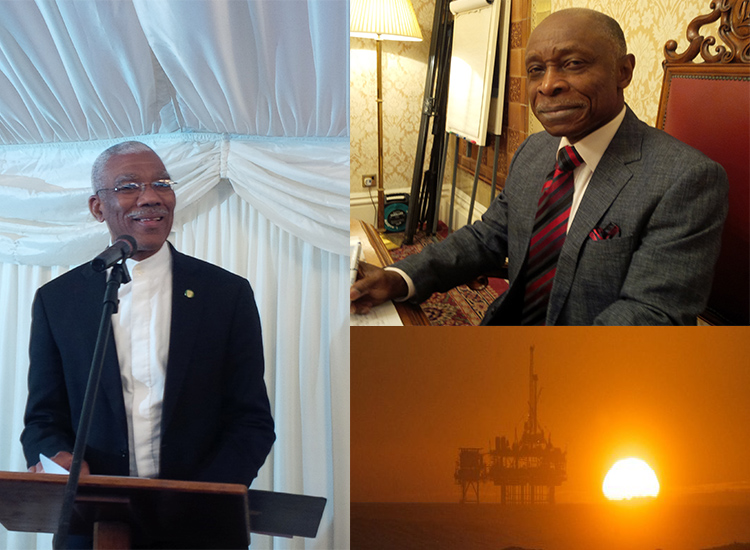CI Shorts: Guyana’s high-profile path to oil

The BBC asked in a May 2019 programme: Will Guyana soon be the richest country in the world? It’s the latest sign of a growing global media focus on Guyana, as its oil production prospects start to excite the oil and financial industries.
Caribbean Intelligence looks at the facts and figures behind the surge of interest in Guyana, which has come during an unexpected election period.
- In 2017, Guyana’s government, armed with the announcements of its upcoming oil riches, sent a delegation, led by President David Granger, to promote the oil industry and its wider investment potential to UK and European businessmen. Foreign Minister Carl Greenidge spoke to Caribbean Intelligence© at a time when the country was also wooing parallel investment in the country’s existing industries, including manganese and bauxite mining, forestry and telecommunications. He said: “The government has been trying for quite a while to attract investment in areas in which Guyana has quite a special advantage.”
- That 2017 UK visit followed the oil finds which are now being labelled as phase one. ExxonMobil said in April 2019 that this phase was on schedule to start delivering 120,000 barrels of oil a day at peak rates by the first quarter of 2020.
- In April 2019, Exxon Mobil announced that work had started on its phase two oil development, based on successive oil finds. This US$6bn offshore project is expected to provide 600 million barrels of oil from mid-2022, meaning that Guyana’s oil riches are likely to be more than a flash in the pan.
- The impact on the local economy is already being felt. Trade publication Oil Now reported that the number of Guyanese nationals in supporting project activities had more than doubled since 2018 to more than 1,000 people. More than 500 Guyanese vendors are working with ExxonMobil. The local ExxonMobil-funded Centre for Local Business Development has more than 1,500 Guyanese nationals registered.
- On the political side, a Christmas 2018 vote in no-confidence vote in parliament triggered the process towards general elections. With the oil finds and figures edging up day by day, it became clear that there was all to play for in the 2019 elections. However, the process has been mired in legal challenges over the right to vote of the parliamentarian who crossed the floor to tip the vote against the government. In addition to this, the government has questioned the electoral commission’s readiness for elections. The local Stabroek News accused the government of using a “delay tactic”.
- It’s hardly surprising that global media attention and advice has been flooding in. With the different examples of oil wealth use set by Guyana’s neighbours, Venezuela and Trinidad, the world’s experts are lining up to advise it on how to distribute its oil money when the coffers start filling up next year.
- Global Americans said in December 2018: “While the amount of oil is modest by global standards, once at target production levels (probably in 2025), Guyana will rival Mexico and Venezuela as an oil producing nation. The transformative potential is significant in light of the country’s small population of 750,000.”
- In a 2018 article entitled How will Guyana deal with its windfall? CNN Business said that “the South American country with the smallest GDP is about to burst with oil”. A senior politics analyst at Verisk Maplecroft, Eileen Gavin, was quoted by CNN as saying that Guyana would need to "manage hydrocarbon reserves in a fiscally responsible manner" and that "the proof of the pudding will be in 2020, when the revenue starts to flow".
- News analysis website The Conversation looked to Guyana’s sovereign wealth fund to avoid the problems of rapid oil wealth without equal distribution. Foreign Minister Greenidge had described this to Caribbean Intelligence as allocating “a portion of the overall revenues... in a manner so that it can be shared with succeeding generations”.
- In February 2019, The Conversation judged that “compared to some neighbours in Latin America and the Caribbean, Guyana is better prepared for its oil boom. To avoid the resource curse, however, the Guyanese government, people and ExxonMobil must continuously hold each other accountable – and remember the pitfalls they face.”
- In May 2019, Guyana trade officials met with Texan oil experts to woo partners who know what to do with oil wealth. The Houston Chronicle described Guyana as “the new oil and gas frontier”. The chief executive of Guyana’s Office for Investment, Owen Verwey, told the paper: “It’s a very, very fast learning curve from not knowing anything about oil and gas to having to do it . This is like dropping someone in the ocean who doesn’t know how to swim.”
Related articles:
Guyana, one of South America’s poorest countries, struck oil. Will it go boom or bust?



